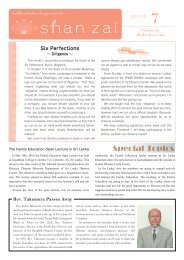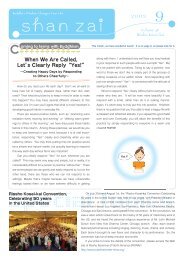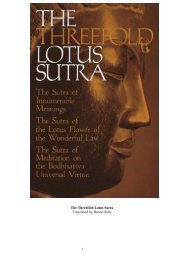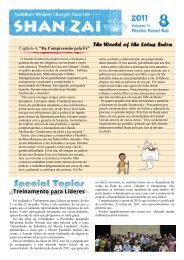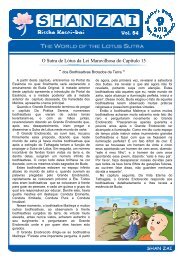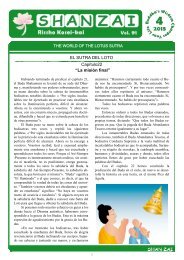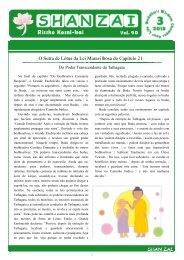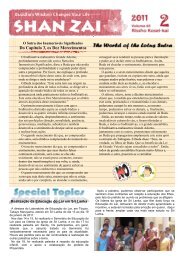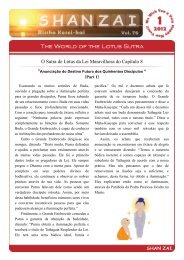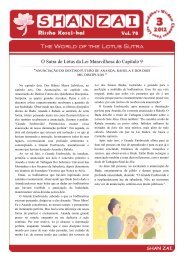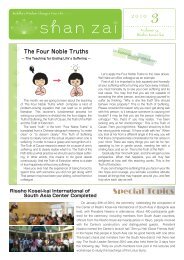and hesitating <strong>to</strong> take a first step even though one has discovered <strong>the</strong> right path, one is unable<strong>to</strong> rid oneself of delusion, and leaves o<strong>the</strong>rs trapped in delusion as well. Nothing could be morefoolish.Oneself and one's family, work, position, and belongings‐‐all are important. However, when oneis freed from <strong>the</strong>se self‐centered fetters, a larger world opens up. If one is liberated from <strong>the</strong>sethings, <strong>the</strong> heart becomes lighter and invigorated, and one begins <strong>to</strong> live for o<strong>the</strong>rs. How mayone be liberated from such captivity? Yamamo<strong>to</strong> Tsune<strong>to</strong>mo (1659‐‐1719) wrote in Hagakure(In <strong>the</strong> Shadow of Leaves), a book on <strong>the</strong> way of <strong>the</strong> samurai, that one does this by dying. Butthat will not do.There is a delightful s<strong>to</strong>ry about Zen Master Fugai Honko (1779‐‐1847) and a horsefly. WhenFugai was <strong>the</strong> priest of a deteriorating temple in Osaka, a wealthy merchant came <strong>to</strong> talk withhim about problems that weighed heavily on his mind. Fugai showed absolutely no interest in<strong>the</strong> man's plight, but instead watched intently as a horsefly flew against <strong>the</strong> window and fell <strong>to</strong><strong>the</strong> floor. Again and again it flew against <strong>the</strong> window and fell. The merchant could bear it nolonger and said sarcastically, "The Reverend seems extremely fond of horseflies." In reply Fugaimumbled, "That horsefly seems fully determined <strong>to</strong> go out that window. Although thisdilapidated temple has big holes everywhere, it keeps flinging itself against <strong>the</strong> window,convinced that it's <strong>the</strong> only way out. But it is not only <strong>the</strong> horsefly that is <strong>to</strong> be pitied."We all believe that our way of thinking is right. One needs that sort of confidence, but if onebecomes enslaved <strong>to</strong> it, one misses out on a larger world. By humbly admitting that <strong>the</strong>re mightbe o<strong>the</strong>r, better approaches, one is freed of such entrapment.I would like <strong>to</strong> recount ano<strong>the</strong>r s<strong>to</strong>ry, about Eisai (1141‐‐1215), <strong>the</strong> founder of <strong>the</strong> Rinzai sect ofJapanese Buddhism. A poor man came <strong>to</strong> <strong>the</strong> temple Eisai founded in Kyo<strong>to</strong>, Kennin‐ji, andentreated Eisai, "My family has had nothing <strong>to</strong> eat for many days. My wife and three childrenare on <strong>the</strong> verge of starvation. Please help us." As things would have it, however, <strong>the</strong> templewas also very poor and <strong>the</strong>re was nothing <strong>to</strong> give <strong>the</strong> man. By chance, however, some copperwas left over from <strong>the</strong> nimbus of a statue of <strong>the</strong> Buddha Yakushi (Medicine Master), and Eisaigave it <strong>to</strong> <strong>the</strong> man and <strong>to</strong>ld him <strong>to</strong> trade it for food. Later some disciples expressed doubtsabout <strong>the</strong> propriety of giving <strong>the</strong> man something as important as a piece of a buddha. Eisaireplied, "In one of his previous incarnations as a bodhisattva, did not <strong>the</strong> Buddha cut <strong>the</strong> fleshof his own body <strong>to</strong> feed sentient beings? Would it not be in keeping with his intentions if wegave <strong>the</strong> entire statue <strong>to</strong> help people dying of starvation? If I am cast in<strong>to</strong> hell for committingthis sin, <strong>the</strong>n so be it. I am only eager <strong>to</strong> save <strong>the</strong> starving."Each time we cease <strong>to</strong> be consumed by something, we become able <strong>to</strong> see a better and morecorrect path. It is by <strong>the</strong>se means that compassion overflows. When we persist in defendingonly one view, do we not lose sight of <strong>the</strong> path of universal truth, which gives life <strong>to</strong> bothourselves and o<strong>the</strong>rs?Each of us always ought <strong>to</strong> cultivate <strong>the</strong> flexibility of mind that is prepared <strong>to</strong> part with <strong>the</strong>"small self." If only we do that, <strong>the</strong> true path will of its own accord come in<strong>to</strong> view and we willbe able <strong>to</strong> follow it meekly. And true salvation will be consummated.The rewards of being flexible enough <strong>to</strong> accept unpleasant truths include spiritual growth for<strong>the</strong> individual, and social progress for <strong>the</strong> community.22
Desires in <strong>the</strong> Service of VirtueAs Japan has come <strong>to</strong> assume a greater role in international affairs, its people have placed greaterimportance on ability in foreign languages and on professional knowledge and skills. These areindisputably significant, but does it not seem that <strong>the</strong>re is something even more important,namely <strong>the</strong> possession of a certain "mirror" with which one can view one's way of life?We have various desires: <strong>to</strong> be found sexually attractive, <strong>to</strong> obtain a better lifestyle, <strong>to</strong> succeedin business, <strong>to</strong> attain positions of honor and distinction, <strong>to</strong> raise our children <strong>to</strong> be respectablemembers of society. Desires such as <strong>the</strong>se‐‐for self‐improvement‐‐are manifold and entirelyreasonable. However, if one becomes enslaved <strong>to</strong> such desires, <strong>the</strong>n one may lose sight of <strong>the</strong>right way <strong>to</strong> live. Therefore one must be extremely cautious.The delusions that lie concealed in <strong>the</strong> depths of <strong>the</strong> human heart are not easily extinguished.The eminent, virtuous priest Saicho (767‐‐822), finding this <strong>to</strong> be <strong>the</strong> case, humbly referred <strong>to</strong>himself as "Low‐down Saicho," and a holy man like Honen (1133‐‐1212) disparaged himself as"Grumbling Honen." This self‐awareness in and of itself is priceless. Too often those who areconceited enough <strong>to</strong> think <strong>the</strong>mselves virtuous never improve spiritually.If we were <strong>to</strong> negate all human desires, we would be left with a mere shell of humanity.Buddhism says that human beings possess 108 delusions, so even if one hoped <strong>to</strong> make a cleansweep of <strong>the</strong>m all, it would be well‐nigh impossible. On <strong>the</strong> contrary, one's whole spirit mightbe caught up in <strong>the</strong> impossible task, and one would find oneself in a great predicament. YetMahayana Buddhism teaches that <strong>the</strong>se same delusions are means for progress along <strong>the</strong> road<strong>to</strong> enlightenment. For example, while <strong>the</strong> agony of lost love may drive one person <strong>to</strong> heavydrinking, it may lead ano<strong>the</strong>r <strong>to</strong> write a superior novel. Aggressive enterprise may lead a personei<strong>the</strong>r <strong>to</strong> break <strong>the</strong> law or <strong>to</strong> contribute <strong>to</strong> a whole nation's prosperity.Now <strong>the</strong>n, how might <strong>the</strong>se delusions be put <strong>to</strong> good use? I believe that <strong>the</strong> foundation for thismay be found in <strong>the</strong> Eightfold Path preached by <strong>the</strong> Buddha. Following his enlightenment, <strong>the</strong>Buddha first expounded <strong>the</strong> Dharma <strong>to</strong> <strong>the</strong> five ascetics in Deer Park, at Sarnath, and preached<strong>the</strong> Eightfold Path, consisting of right view, right thinking, right speech, right action, right living,right endeavor, right memory, and right meditation. If one set out <strong>to</strong> practice all eight from <strong>the</strong>very beginning, one would very soon abandon <strong>the</strong> attempt as impossible. As a first step, let usconsider putting <strong>the</strong> first three in<strong>to</strong> practice. As one endeavors <strong>to</strong> see, think, and speak rightly,<strong>the</strong> remaining five naturally follow along in good order.The terms "right" and "rightly" mean thinking and behaving in ways consistent not only withreason and ethics but with <strong>the</strong> two truths "All things are impermanent" and "Nothing has anego.""All things are impermanent" means that everyone and everything is constantly changing. Thesun and <strong>the</strong> innumerable o<strong>the</strong>r heavenly bodies are incessantly metamorphosing; <strong>the</strong>suba<strong>to</strong>mic particles that constitute all matter change from moment <strong>to</strong> moment. Nei<strong>the</strong>r ourbodies nor our environment are exempt from this law of change. For example, Japan's lifetimeemployment system, so often pointed <strong>to</strong> as a special feature of Japanese companies, is slowlyundergoing a change. More and more workers change jobs in pursuit of work where <strong>the</strong>y maymake better use of <strong>the</strong>ir abilities, and even large corporations have begun <strong>to</strong> hire people inmidcareer. Fur<strong>the</strong>rmore, <strong>the</strong>re are continuous changes in management styles, from a stress onapplied technology <strong>to</strong> an emphasis on basic technology, from <strong>the</strong> pursuit of efficiency <strong>to</strong> aquest for creativity.23
- Page 1 and 2: Invisible EyelashesSeeing What is C
- Page 3 and 4: THE TWO FUNCTIONS OF A CELL 55The P
- Page 5 and 6: For this to take place, it is vital
- Page 7 and 8: Pleasure is filling the empty rice
- Page 9 and 10: Rose or Thorns?The rose is beautifu
- Page 11 and 12: The Contents of Hotei's SackThe mor
- Page 13 and 14: GratitudeFor the past two decades I
- Page 15 and 16: Looking Into the DepthsEach of us m
- Page 17 and 18: Self‐AwarenessSometimes we allow
- Page 20 and 21: the mountains, Po Chu‐i went to m
- Page 24 and 25: "Nothing has an ego" means that all
- Page 26 and 27: self‐love, endeavoring to develop
- Page 28 and 29: ampant, Dr. Schweitzer devoted his
- Page 30 and 31: Everyone has some ability that is b
- Page 32 and 33: een pondering Kepler's theories of
- Page 34 and 35: improved, I would return home only
- Page 36 and 37: work.In another section, "The Daily
- Page 38 and 39: Hakone, I finished in fifty‐five
- Page 40 and 41: Many people want to work in their o
- Page 42 and 43: eplied, "One hundred divided by two
- Page 44 and 45: at the gate, the Buddha appeared an
- Page 46 and 47: once again sinks into despair, it t
- Page 48 and 49: individuality grows beyond the boun
- Page 50 and 51: this truth, one becomes keenly awar
- Page 52 and 53: suddenly turned irritable and said,
- Page 54 and 55: well in a sport, one obeys the rule
- Page 56 and 57: There is, however, one infallible r
- Page 58 and 59: The offering of kind words means sp
- Page 60 and 61: We must never think of ourselves an
- Page 62 and 63: The Wind Blowing from the FutureThe
- Page 64 and 65: Courage That Opens DoorsI have many
- Page 66 and 67: "Even Insects Work and Eat"My paren
- Page 68 and 69: Home Is More Than a HavenIn recent
- Page 70 and 71: Where Affection and Gratitude Begin
- Page 72 and 73:
Forever Young at HeartAlmost every



